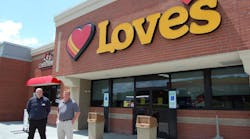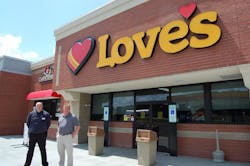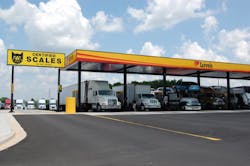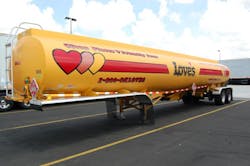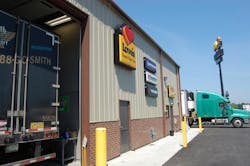[To view more photos of Love’s Salisbury site, click here.]
Yet neither the heat nor the vehicle traffic dissuade either Jeff Webb, general manager of Love’s Salisbury location, or Bill Stanton, Love’s district manager for North Carolina and Virginia, from making their rounds.
[That's Webb on the left and Stanton on the right in the photo above at right.]
I got the chance to visit Love’s Salisbury travel center back in May since Shell held its annual Super Rigs competition in nearby Charlotte – largely to obtain a “behind-the-scenes” glimpse of how truck stops provide the ubiquitous “food and fuel” services expected by big rig operators and everyday motorists alike.
[For a little history about this venerable truck stop chain, go here.]
Webb typically arrives at 6 a.m. and conducts what he calls a quick “drive around” of the entire facility just to see if there’s anything glaringly wrong he needs to take care of immediately. Once parked, he gets out on foot and combs the fuel islands and parking spaces, making sure pump nozzles are clean, there are no spills, trash cans are emptied and loose trash picked up.
He then goes inside to ensure store shelves are neat and properly stocked and that the restaurants (in his case a McDonald’s and Chester’s Fried Chicken) are operating smoothly, along with the fuel desks.
Later, he’ll stop by the two-bay Tire Care Center at the back of the Salisbury facility to make sure things are ship-shape there, too.
It’s a process that doesn’t stop for Webb during the day as he doesn’t have an office. Instead, he’ll just stay almost continuously in motion, jumping in to help where needed – re-stocking shelves, closing sales at the gasoline and/or diesel “desks,” even cleaning bathrooms or one of the facility’s seven showers if necessary.
Yet Webb explained to me that he “wears a lot of hats” in this fashion due in part to his own history as a truck driver. “I spent 10 years out on the road, then eight years working at truck stops – the last two for Love’s,” he said. “I’m very familiar with how tough life on the road can be and I’m putting that experience to work here.”
Webb and Stanton both stressed that truck drivers can get food and fuel almost anywhere from any number of providers. Thus customer service is the one big differentiator out in the truck stop world.
“A driver is out on the road for 10 hours at a time, so the truck stop for them is often one of the few times they get to interact with people,” Webb said. “Thus they want friendly service, working pumps, plus clean showers and bathrooms.”Stanton said the key to providing what he calls “top drawer” service is to find good people to staff a truck stop and then put a lot of trust in them to do things right.
“We not only teach them but get our managers to lead by example,” he noted – emphasizing why general managers at Love’s facilities jump in and do the “dirty work” such as cleaning bathrooms. “If they do that, they become our fire fighters; they are doing daily checks and making things right all on their own. If we cover our bases that way, if we’re firing on all cylinders as a team, then there will be few customer service ‘fires’ to put out.”
Another example of the “team ethos” that pervades Love’s Salisbury location is that the eight technicians staffing the two-bay Tire Care Center at the back of the property pull double duty as grounds keepers – mowing the lawn every Tuesday, weeding and cleaning up trash as necessary.
The site also functions under what Webb dubbed the “eight hour rule” in that trash cans are emptied, fuel nozzles cleaned, and the windshield cleaning fluid available at both the gasoline and diesel fuel islands gets replaced every eight hours.
Love’s also continues to try and broaden its array of services as well in order to meet more of the industry’s needs. For example, in June, the company rolled out Love’s Financial to offer freight factoring services to help drivers manage their business and cash flow through flexible cash management products with lower transaction fees.
Gary Morgan, director of Love’s Financial, noted that drivers can wait up to 60 days for payment from shippers after delivering a freight load, whereas via factoring they can get paid within 24 hours or less, which provides the capital they need between loads to cover upfront expenses, such as fuel, insurance and payroll.
He added that drivers can factor with Love’s remotely, or at any Love’s that offers Transflo Express. Factoring is different than a loan, meaning drivers won’t incur debt and it comes without the same level of credit restrictions.The company is also trying to help make natural gas a more attractive option for fleets by installing “fast-fill” compressed natural gas (CNG) systems capable of refueling a heavy truck at a rate of 10 gallons per minute; meaning a driver can fill a 100 gallon equivalent tank in 10 minutes or less, noted Bill Cashmareck recently, the general manager of natural gas at Love’s.
So far Love’s has opened four fast-fill CNG locations – three in Texas and one in Oklahoma – with another 12 on the way for 2015 and beyond, with another six planned for Texas, three in Oklahoma, and one each in Ohio, Arizona, and New Mexico.
“We believe these locations will be in areas of high demand as the market for this cost-efficient fueling alternative evolves,” Cashmareck said. “We’re focused on serving both our heavy-duty customers and the general public [and] plan to increase coverage for the general public by adding a light-duty option ‘fast-fill’ option to our existing 11 light-duty CNG stores throughout Oklahoma.”
Like many other travel center chains, Love’s is also trying to beef up its truck maintenance and repair offerings so it can continue to be more of a “one stop shop” for independents and fleets alike.
Aside from providing most types and brands of truck tires at its 190 or so Tire Care Centers typically co-located at its truck stops – brands such as Bridgestone, Firestone, Aeolus, Michelin, Michelin Retreat Technologies, Goodyear, Continental, BF Goodrich and Yokohama – the company plans to double from the current 70 locations hat offer light mechanical services by the end of 2014.
“Expanding light mechanical locations means drivers can count on quality service and professionalism for electrical repairs, belts and hoses, fleet and DOT inspections, brake repairs and more,” noted Tom Love, the chain’s founder and executive chairman, back in March. “We’ve received an overwhelmingly positive response since light mechanical services were introduced in 2012. The lifeblood of a driver is being on the road, and we believe it’s our responsibility to offer the best range of products and services to get them back on the road quickly, safely and with proven products.”
Love’s is also reinvesting in its existing truck tire care facilities by adding tire and part warehouse space along with more enclosed bays, more room and increased amenities.Technology isn’t an afterthought at truck stops today, either, and that’s another area Love’s hopes to keep expanding upon – especially where radio frequency identification, or RFID, is concerned. Love’s offers an RFID-enabled diesel fuel payment system at its truck stops, with a low cost RFID tag placed on a truck’s windshield allowing drivers to turn fuel pumps on and off as well as complete the payment transaction with little interaction.
Jon Archard, director of fuel marketing for Love’s, said RFID technology provides a valuable benefit not only because it’s easy for drivers to use, but that it also provides a major fuel theft deterrent and provides more accurate payment tracking information.
"A gallon of diesel fuel costs roughly $4. If RFID technology can eliminate just 1% of fuel theft or other unauthorized fuel purchases, the trucking company has saved four cents per gallon,” Archard said. “There aren't many ways for a fleet to see this sort of financial impact with such a minimal cost to do so.”
“Having the ability to activate the pumps and pay for fuel without having to swipe a payment card and then come in to the diesel desk to get the pump started is a big time saver,” Webb explained. “It just removes one more hassle a driver needs to deal with. Because today, the way hours of service (HOS) rules are set up, drivers want to maximize their time on the road. And as an RFID system can help them do that, we want to have it in place for them.”
Just one more example of what’s going on under the surface at the truck stop in order to help make a driver’s day – and thus that of the industry’s – more efficient, more comfortable, and more profitable.
